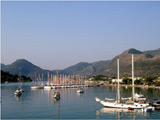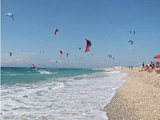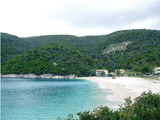Lefcas, or Lefkada as the Greeks call it, is a very popular summer resort, where there is something for everyone. Young visitorís party all night, windsurfers have some excellent spots, there are quiet places for those who just want to relax, and there is a lot to see.
The people on the island are known for their hospitality, and many of them manage to live off the tourism in the summer. Others are involved with farming, fishing and stockbreeding.
The island's name means white, and refers to the white cliffs in the south part that are characteristic for Lefcas. It is a green, mountainous island, and it is connected to the mainland by a bridge. The island measures 290 sqkm and has a population of approx 24,000.
Archaeological evidence points to that Lefcas has been inhabited since the Stone Age (4th Millennium BC). According to mythology, the island was given by Odysseus father to Penelopes father as a wedding gift. The cliffs of the island were a "favourite" suicide spot for people with broken hearts, and some legends claim that it was here, and not on Lesbos, that Sappho jumped to her death after her love for a sailor had not been returned.
The people on the island separated the island from the mainland by making a canal in the 7th century BC. In the 4th century BC the Macedonians conquered Lefcas, and the Romans invaded in in 2nd century BC.
The island went through many wars and attacks from nations and pirates, and in 1204 it fell under Frankish rule. The Turks took the island in 1479 and after constant battles with the Venetians, the island changed rulers several times, but the Turks lasted the longest and stayed until 1684.
What followed would again be years of different rulers, constantly changing hands. The Venetians succeeded the Turks, and was then forced to give the island back to them. At the end of the 18th century the Napolean armies invaded, then the Russians came, only to be followed by the British in 1810 for five years. Lefcas remained a British protectorate, though, until 1864.
Quite a few famous Greeks were born on Lefcas, but they are not so well known abroad. The one you are most likely to have heard of is Aggelos Sikelianos (1884-1951), nominated for the Nobel literary prize twice.
Tourism came in the 1960's, when the international press gathered on the island to be close to the shipping magnate Onassis and his wife Jackie.
Windsurfing and watersports are the two major things to do here, but the island also is very nice to explore yourself, either on foot or by renting a vehicle. There are often events going on in the Castle of Agia Mavra, and you can go on several boattrips to the neighbouring islands, as well as Onassis' island Scorpio - which, of course, you can not visit.
Beaches
are both sandy and pebble here. On the beaches around Nidri you'll find lots of watersports and taverns, but there are also several more quiet beaches like Lagada and Dessimi. The most bars and discos are in Nidri, and this is a paradise for people who really want to party. Lefcas town also has many options. If you want a more quiet time, Perigiali and Nikiana might suit you better. Also, there is both Greek and international food served on the island. You get the most choices in Lefkas town and Nidri, but there are also many taverns in the villages and at many beaches.
  
Click to enlarage |

